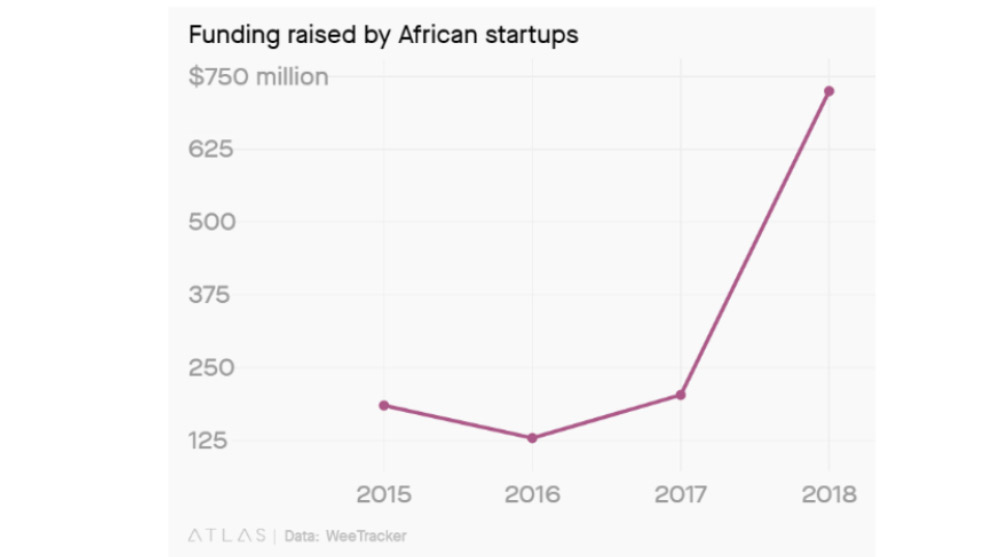
Date: April 27, 2019
The African continent has received its fair share of investor attention in recent years due to its steady growth rate, rising middle class and potential for wealth creation. African startups sealed 458 deals in 2018 accruing a record $725.6 million, out of which the top 10 deals accounted for 61% of the total investment. With a four-fold growth in as many years, a large number of African nations are at the epicentre of a growing knowledge-based economy. When such a thriving economy based on innovation and technology evolves, it attracts investment pulling out millions of Africans out of poverty.
Africa is a resource rich and diverse continent with a potential yet to be fully realised. But even with all its natural wealth and the intellectual prowess of its young and aspiring middle class, it cannot unlock this potential without the support of the government sector and the investment that comes from the private sector. The Indian startups have taken cognizance of the opulent abundance that is the African market.
Startups usually have limited financial capabilities therefore they would greatly benefit from the lack of staunch competition and the first mover advantage that they can have in African countries. This will be in stark contrast to launching a product or service in a developed market like the USA.
Emerging markets like Africa are also growing at a much faster rate. World Bank has predicted a steady 3.4% GDP growth rate for the sub-Saharan Africa in 2019. In fact, economically weaker countries in Africa are showing a growth rate of over 6% in their non-commodity driven markets such as Niger, Rwanda, Senegal, Tanzania, Uganda, Ethiopia, Ghana and Burkina Faso.
Africa has a similar consumer behaviour and purchase power as India has. The markets are less cluttered and hence Indian startups can gain a strong hold there, that too at a higher premium and margin than they would in a developed market.
With the rich experience of serving a similar market in India, Indian startups can apply their technical knowledge and expertise to tap into unsaturated markets. Already, Indian startups are moving into the African territory to make hay while the sun shines. For example, Zomato is now present in South
Africa while Capillary Technologies has a set up an office in Trinidad. Cloud telephony provider Knowlarity is also moving into North Africa. These companies want to reap in the benefit of entering an emerging economy earlier than others.
The common denominators between Africa and India are the consumer behaviour and purchasing power of both the geographies. Indian startups, with their unique experience of working in the Indian ecosystem, know how to work around the obstacles and opportunities that such an ecosystem brings. With African population all set to double over the next 30 years, it will benefit from a foreign investment from India leading to more jobs. It can also mean social development through agritech and healthcare startups and their purposeful innovations. Indian government along with FICCI, recently took a delegation of 21 Indian startups to Kenya with the agenda ‘African development through Indian technology and innovation (ADITI).
The aim of the startups under this programme is to offer innovative and affordable solutions to the African market with last mile delivery in sectors like agriculture, healthcare, water, sanitation and financial inclusion. For example, Cassava is a staple crop of Africa. CassavaTech is a technology introduced in Kenya by an Indian startup. It reduces the capital cost of processing Cassava from $1500 to $200 and brings down the operating costs from $20 to $2. It also reduces the drying time from 10 days to 10 hours in order to produce Cassava flour. Similarly, another startup has come up with low cost menstrual hygiene pads for females.
India’s tech industry model has already proved that one can grow its tech sector to billions of dollars by bringing together technological innovation, a young and educated population and a fairly supportive governance structure. India has seen major success within its tech sector and employs roughly 10 billion people today. Africa is on the cusp of this model and taking a leaf from India’s story could serve it well.
The governments of countries like Lagos and Kenya have already realised that in order to flourish they must welcome technology and startup innovation. It has supported the cause of innovation and entrepreneurship in their countries leading to a startup revolution. It must be considered that Africa is more or less where India was 20 years ago. African countries are adopting information and communication technology as its lever of economic growth, just like India did. With the experience of achieving success through tech innovation, Africa can bring in the efficiency and speed that can help its countries unlock their true potential.